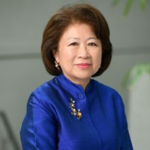The innovation, creativity, and boldness I see in women entrepreneurs around the world never cease to amaze me – from post-tsunami Indonesia where women shop owners stood in the ruins to care for the community, to southern Africa where female startups founders are developing solutions to tackle climate change.

Mari Pangestu, Managing Director, World Bank Group & Leadership Champion of We-Fi
In We-Fi’s forthcoming Annual Report, you will find many inspiring stories of such resilient and entrepreneurial women. Despite the adversity of the COVID-19 pandemic, women entrepreneurs continue to contribute to the economy, while creating social impact. Iman Jamall’s Pakistan-based company CreditBook provides a free, mobile-based solution so that local SMEs can manage their credit and payment transactions digitally. Priscilla Veras, having witnessed extreme rural poverty in South America, quit her job and created a platform that connects smallholder farmers directly with retailers, guaranteeing fair prices for fresher, sustainable produce.
Iman and Priscilla exemplify the economic potential women can unleash when societies allow them equal opportunities and rights. While more countries are making progress toward gender equality, large gaps remain between the ambitions of women entrepreneurs and the daunting challenges they face – particularly in low-income countries and countries affected by fragility.
It is to realize their aspirations that the Women Entrepreneurs Finance Initiative (We-Fi) was established. The Report shows that after four years of implementation, We-Fi has had a significant impact, allocating $300 million to its implementing partners. The funding has become even more critical, as the COVID-19 pandemic has exacerbated barriers that existed before the crisis; our data show that women have been disproportionately impacted by COVID19 – women entrepreneurs suffer greater supply disruptions and more prolonged stoppages, and women overall experienced higher layoffs.
At the World Bank Group, we are focused on helping developing countries recover and achieve green, resilient, and inclusive development as they emerge from the crisis. Creating economic opportunities for women is central to this work, especially in low-income countries which have been hit hardest. Gender is a priority for the International Development Association or IDA, our fund for the poorest, which just received a replenishment commitment of $93 billion over the next three years. We have also launched the Accelerate Equality initiative marking the 10th anniversary of the World Development Report on Gender Equality and Development.
We-Fi is playing a unique role to complement World Bank Group efforts. It helps to design and support innovative approaches with new public and private sector actors; crowd in funding; and gather knowledge from creative partnerships. As cited by the 2021 independent mid-term review, We-Fi’s value lies in its ability to build a global stakeholder network that includes bilateral donors, multilateral development banks, and the private sector. Moving forward, the catalyzing effect of We-Fi’s programs across the globe will inject more confidence in financial institutions as they make decisions to support women-led businesses. We all lose when women cannot survive as entrepreneurs and employers.
In 2022, We-Fi will broaden its partnership to scale solutions, resources, and innovations as it lays the foundation for its next five-year program. We look forward to hearing more success stories as we work together to further We-Fi’s mission.

